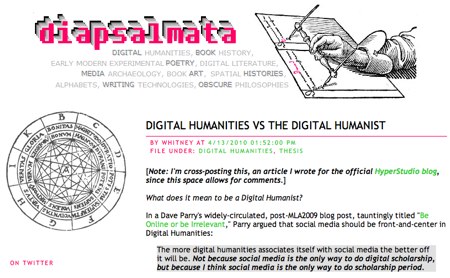What Shall We Study?
Stacey Mason

Whitney Trettien reflects on her digital thesis to ask, “What does digital humanities really mean?”
So what was I doing? My born-digital thesis was not a scholarly resource: I wasn't and never intended to present or curate a collection of digital artifacts for others to browse. My work was critical and individualistic, conscious of its methodology and historical moment. It strove for self-awareness. In this respect, it had more in common with the essays on Kairos than with the work of NINES; yet it never emerged from the disciplines of rhetoric and composition. I was more interested in challenging notions of "old media" literacies, or even "literacy" itself, than exploring those of "new media."
I was positioning my work as Digital Humanities, but Digital Humanities didn't really want to claim it.
I have noticed a tendency in digital humanities to focus on the archive. This fits nicely with disciplinary convention, but digital content delivery may change scholarship in a profoundly. At times, the humanities need a reminder that born-digital works have a place in their digital collections.
